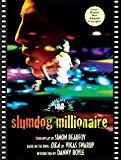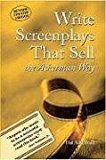Non-fiction history writing is a burgeoning market. If you’re an amateur historian or genealogist you may find a paying outlet for your masses of research. In this series we will look at how to turn history into commercial articles or books. Continue reading ‘Writing history for the commercial market – 1: finding the social context’
Archive for February, 2009
Love is in the air, this Valentine’s Day, but fortunately for the survival of the species, it’s not restricted to Feb 14. As writers reflecting the breadth of life experience, we may be called upon to write love scenes. If the nominees for Literary Review’s Bad Sex Award are anything to go by, this isn’t as easy as it sounds. So The Crafty Writer asked steamy romance writer Pollyanna Williamson for some hot tips.
Continue reading ‘Writing love scenes that sizzle’
 If it’s not on the page, it’s not on the screen. This is what Oscar nominated and Golden Globe winning screenwriter, Simon Beaufoy (The Full Monty, Miss Pettigrew Lives for a Day, Slumdog Millionaire) knows full well. Our friends over at The Script Factory offer you a free masterclass on what makes the Slumdog screenplay tick. In addition, they give advice on how to handle flashbacks without losing forward momentum. So why not get the script for yourself? Nick Hern Books have published the shooting script in paperback and is available here: Slumdog Millionaire: the Shooting Script.
If it’s not on the page, it’s not on the screen. This is what Oscar nominated and Golden Globe winning screenwriter, Simon Beaufoy (The Full Monty, Miss Pettigrew Lives for a Day, Slumdog Millionaire) knows full well. Our friends over at The Script Factory offer you a free masterclass on what makes the Slumdog screenplay tick. In addition, they give advice on how to handle flashbacks without losing forward momentum. So why not get the script for yourself? Nick Hern Books have published the shooting script in paperback and is available here: Slumdog Millionaire: the Shooting Script.
Check out the trailer if you’re not sure what all the fuss is about:
 If you’re looking for a comprehensive book on screenwriting, then Write Screenplays that Sell might be the one for you. This beginner to intermediate guide is written by a UCLA Screenwriting graduate programme lecturer, Hal Ackerman, whose students regularly go on to receive professional Hollywood commissions. The book provides a good overview of narrative structure, a detailed guide to writing scenes and some useful and thought-provoking exercises. If you want to know a bit more about the book before you buy it, why not listen to the author himself?
If you’re looking for a comprehensive book on screenwriting, then Write Screenplays that Sell might be the one for you. This beginner to intermediate guide is written by a UCLA Screenwriting graduate programme lecturer, Hal Ackerman, whose students regularly go on to receive professional Hollywood commissions. The book provides a good overview of narrative structure, a detailed guide to writing scenes and some useful and thought-provoking exercises. If you want to know a bit more about the book before you buy it, why not listen to the author himself?
